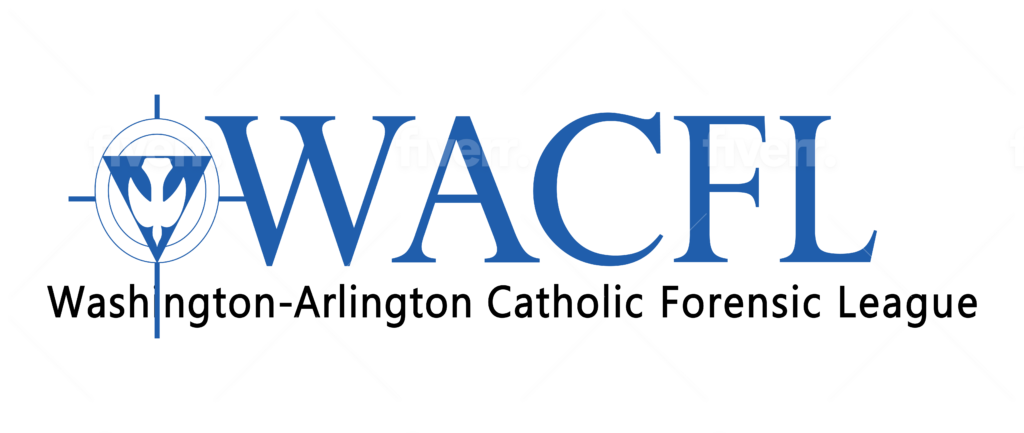Volunteer judges are vital to the success of speech and debate tournaments. Each school is required to supply judges proportional to the number of students entered. Every parent with a student competitor should consider volunteering with their team’s coach. Interested community members, teachers and former competitors are all welcome to judge. The information below will prepare you to judge at your first WACFL tournament!
At a WACFL speech tournament, it’s important that you not judge the same student(s) twice, so tournament managers will likely schedule you for four different events. You do not need to memorize the rules for each event! On tournament day, when you receive each round assignment from Tabroom.com, you’ll know which event you are judging. Then visit the Competition Events page on the WACFL website and familiarize yourself with the guidelines for the event before you go to the competition room. That information, along with the judge guidelines linked to the left, will answer most of your questions.
For each round, you will rank students from 1 (best) to 6 (worst.) It’s considered “best-practice” to rank students as the round progresses. Meaning, after the first two students, you rank them (privately) as 1 and 2. After the third student speaks, you decide whether to place them first, last or between the two other competitors. As each successive student speaks, you decide where they fit between the previous competitors. This way, when the round is done, your rankings are complete.
At preliminary tournaments (held October through February) you will be the only judge in the room. At MetroFinals, there will be two judges in each round.
At each WACFL debate tournament, you will only judge one event. We do not shift you between debate styles. Public Forum and Lincoln-Douglas tournaments are “double-flighted.” This means each of the four rounds consists of two debates, a “flight 1” and a “flight 2.” Judges remain in the same classroom for both flights and the students will change. At preliminary tournaments (held October through February) you will be the only judge in the room. At MetroFinals, there will be two judges in each round.
Judging at your first debate tournament can feel challenging. Don’t be overwhelmed! There is a wealth of judging information on this page. Your team coach can provide additional details. On tournament day, experienced judges and league officials will be available to answer your questions. There is no “perfect” in judging. Experienced judges often reach different conclusions on which student(s) won the debate. Listen closely, take notes, and use your best judgment. At each tournament, you will improve!
For details on judging each event, click the appropriate button to the right.
Regardless of the event, each preliminary WACFL tournament follows the same schedule. Tournaments are on Saturdays and a generous member school hosts us for the day. Students, judges, and coaches should arrive between 8:00 – 8:15 am. When you arrive, check-in with your team’s coach so they know you are there. You should plan to stay until 6 pm, but if we can accelerate the tournament schedule, we will do so. The host school will have food for sale during the tournament. Lunch is provided to judges at no cost by WACFL and the host school. Participants are also welcome to bring their own food. With the exception of Student Congress, each student will participate in four “rounds” of competition.
For full details on the daily tournament schedule, click the button on the left.
Even though Public Forum, Lincoln-Douglas and Policy Debate have different topics and formats, the process for judging is the same: determine winners, provide constructive feedback, and ensure the debate is fair. But for each of these areas, there are best practices on how to perform these tasks.
The document linked to the right summarizes what first time volunteers need to know about judging these events. You should also read the event specific judge instructions, linked above on this page. Also, be sure to attend the pre-tournament judge briefing held at 8:30 am on each tournament Saturday. WACFL officers will be available there to answer your questions.
The National Speech and Debate Association (NSDA) has created a series of excellent training videos for both Speech and Debate events. Each video is short and is organized by event and experience. The Level 1 videos are for new judges. There is one video each for Student Congress, Speech and Debate. The Level 2 videos go into greater depth and are event specific.
These are optional! WACFL does not require judges to complete these prior to judging at a tournament. But if you choose to view these and correctly answer questions at the end, you will earn an NSDA Judge Accreditation which will display on your Tabroom.com account.
You can access the videos by clicking on the button to the left.
New this year, WACFL encourages judges to write and post a paradigm. A judge paradigm is a statement that describes your experience, beliefs and expectations for a round. Paradigms help both judges and students. Competitors can adapt their strategies to the judge’s preferences. With a paradigm, judges are more likely to hear a pace and style that corresponds to their experience level. WACFL does not require judges to write a paradigm. It is optional.
Paradigms are posted in Tabroom.com and available to students, coaches and other judges. Judge paradigms are public information, so consider what you write. To post a paradigm, log into your Tabroom.com account and look along the right side of the home page, under the heading Judging. You will see a button labeled Paradigm. Click on that and you will be able to post your paradigm. You can also read other judge paradigms by clicking on the tab labeled Paradigms at the top of the home page.
The button to the right takes you to a short overview of how to write a judge paradigm.
